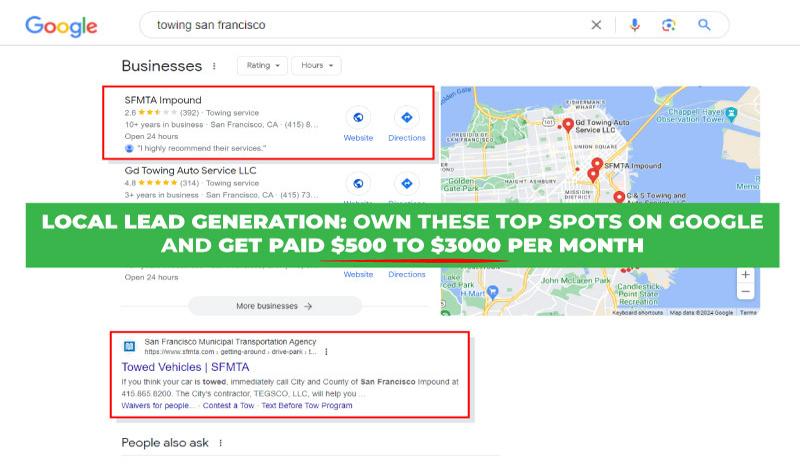Top 11 Ways To Make Money Online in New Zealand: What are the Legal Requirements?

The top 11 ways to make money online in New Zealand include:
- Starting a local lead generation
- Selling products online
- Starting online trading
- Working as a freelancer
- Starting affiliate marketing
- Starting dropshipping
- Selling print-on-demand products
- Taking part in online surveys and market research
- Selling online courses
- Selling stock photos or videos
- Working as a virtual assistant
This list is ranked by potential earnings and difficulty. It includes both business models and online jobs. Starting with local lead generation businesses down to virtual assistant work. You can earn as little as $0.50 per survey to as much as $10,000+ a month from e-commerce. These can be both full-time and part-time. It does not include semi-online ways to make money, such as working as a delivery or Uber driver.
It is a great time to earn money online in New Zealand. The diversity of making money online can lead to a better work-life balance. The demand for remote work is growing in local and international markets. The local e-commerce market is expected to reach $7.2 billion in 2025. Demand for digital marketing is rising as businesses shift online. Even better, the New Zealand government promotes digital inclusion and supports the digital economy. These facts highlight the opportunity for residents of New Zealand to earn online.
Audrey van Ryn is a former English and music teacher from Auckland. At 57 years old, she discovered Freelancer.com. She earns $30 USD an hour as a copy editor and proofreader and has a 100% completion rate. The flexibility of online work has allowed her to create a work-life balance. She says that it is hard to find work at her age. However, age doesn’t matter when finding work online.

There are also downsides to making money online in New Zealand. The BDO New Zealand Risk Landscape Report warned of rising cyberattacks and fraud. This increase is caused by cybercriminals taking advantage of AI advancements. This poses a risk to your online data and business. NZ Business reported that 50% of New Zealand businesses lack digital enablement. This means that you will have to invest a lot of time to find success. You likely also need to invest in software and tools to help you in your online venture.
I’ve been making money online for over a decade and have created several 6-figure businesses. My main businesses were Amazon FBA, Shopify dropshipping, and affiliate marketing. The article will explore the top ways to make money online in New Zealand, such as lead generation, ecommerce, and trading. I provide real-world examples of New Zealand entrepreneurs and brands like Jeremy Lagatule and Little & Loved.
1. Starting Local Lead Generation for Local New Zealand Services
Local lead generation is a digital real estate business model that creates passive income. You use SEO to rank a niche site on Google. You then rent this site out to local businesses that profit from the leads. For example, you create and rank a site on tourism adventure guides in Queenstown, New Zealand. You then rent out this site to a tourism company that operates in the area. When customers Google “adventure guides in Queenstown,” your site will be at the top of the results. The tourism company pays you monthly for the steady flow of leads it receives. You earn $500 to as much as $3,000 a month from a local lead gen site.
In 2014, I made money online full-time with my local lead generation business. I have dozens of sites in many niches and locations. I catered to various industries, like tree care, towing, and limo rental. The process of ranking and renting sites is repeatable without adding costs or risks. This allowed me to scale easily. I currently have dozens of sites that earn me a total of $52K a month.
WebFX reports that 46% of online searches are looking for local businesses. 50% of customers also visit businesses with physical stores on the day of the search. These stats highlight the importance of online visibility for local businesses. SEO specialists and lead generation sites are always in high demand. However, it may take some time and effort to learn SEO skills.
2. Selling Products Online on the New Zealand Market
Create an e-commerce store to sell products online. A store website has many benefits, especially if you sell your own branded products. It allows brand building and removes the need to share profits with ecom platforms. You will need to do your own marketing to get visibility. Selling on e-commerce platforms lets you tap into their large customer base. Most e-commerce platforms also provide logistics, fulfillment, and customer service. Popular ecom platforms in New Zealand include Trade Me, Facebook Marketplace, Amazon, and The Market.
Little & Loved is an online store that sells eco-friendly products for children. The brands sold in the store are carefully handpicked by the founder, Zoe Salmen. Little & Loved started in an Auckland City apartment while Zoe was on maternity leave. It launched with almost 50 products in 2013. Today, Little & Loved maintains a home office and warehouse in New Lynn, Auckland.
Statista reports that 1.6 million New Zealanders, 37% of the population, shop online. Online shopping makes up 14% of the country’s retail sales. This highlights the high demand for goods online. Online stores often have lower operating costs due to the absence of a physical store. They have a nationwide reach and may even access international markets. Common disadvantages include logistics and competitive marketing.
3. Starting Online Trading Using Popular Brokers in New Zealand
Online trading uses online brokers to trade stocks, commodities, cryptocurrencies, and currencies online. Popular online brokers in New Zealand include Interactive Brokers, Swissquote, and Admirals. You can trade part-time or full-time and use short-term or long-term trading strategies. Short-term strategies include scalping and day trading. Long-term strategies involve buying and holding for over 24 hours to several years.
Shammy is an online stock and crypto trader from New Zealand. He first started trading in 2015. He went through a lot of challenges before finding success in the New Zealand stock market. Sammy was making $1,000 to $3,500 a day. In 2020, he started posting content about his trading journey. Soon after, he started selling courses. Shammy no longer sells any courses, and he has stopped posting since April 2022.

The NZ Herald reported that the New Zealand stock market dropped by 1.5% since 2025 started. RNZ says that it is expected to rebound with a 2.17% increase in the next 2 years. If predictions are right, this could mean a hefty profit for those who invest now. However, be aware that the volatility of the market presents a constant risk. There has been a continuous decline post-pandemic. Geopolitical events, such as the war in Ukraine, have affected stock market prices.
4. Working as a Freelancer in the New Zealand or International Market
Working as an online freelancer is a great side hustle. Make the best use of your skills by offering services to clients online. You can do this on a project basis, which frees you from the hassles of long-term contracts. You can also work full-time in freelancing by taking on multiple clients. Freelancing is popular as you decide your schedule and when you want to work. As a freelancer, you are not limited to the NZ market and can work for international clients. Find clients by promoting yourself, using social media, or through platforms like Upwork or Fiverr.
Paul Hunkin is a successful software development freelancer from Tauranga, New Zealand. He is a Top Rated Upwork freelancer with over $400K in earnings. His rate is $150.00 an hour. Paul has over ten years of software development experience. He has worked with high-profile clients like Google, NASA, COMAC, and InfoSys. In 2023, he started his own business, Jsonify.
HRNZ says a third of New Zealand’s workforce is part-time, freelance, or self-employed. This highlights the popularity of the “gig economy.” Most of these are on-site, but remote work is growing in popularity. Freelancing comes with several challenges. You must find clients and compete with thousands of more experienced freelancers. Landing regular work is the number 1 challenge with freelancing.
5. Starting Affiliate Marketing in the New Zealand or International Market
Affiliate marketing is great for earning extra income. The low entry barrier makes it easy for anyone to get into. You don’t create products or keep inventory. Instead, you earn commissions from promoting affiliate products. You can promote your affiliate link using various marketing strategies. This includes blogging, running ads, and social media posting.
Jeremy Lagatule is an affiliate marketer from Auckland, New Zealand. He started in 2009 when he launched his blog, Random World, and earned his first $1 commission. In 2014, he expanded into posting on social media. Jeremy has sold thousands of different affiliate products. He was even an affiliate marketer for big brands like Amazon, PayPal, and Google.
Virtual Marketers found that only 15 of the top 100 New Zealand businesses have affiliate programs. New Zealand is behind in businesses utilizing this marketing strategy. This is a sign that affiliate marketing is not saturated in the New Zealand market. New opportunities will appear as more businesses look for affiliate marketers.
6. Starting Dropshipping in the New Zealand Market
Dropshipping is a way to sell products online without holding inventory. You list items on online and only pay for them once an order is made. The items are then shipped directly to the customer by your supplier. In a sense, you act as the middleman who just markets the product. You can create your own site or use e-commerce platforms. It is suggested that you find local suppliers for the New Zealand market. Popular dropshipping suppliers in New Zealand include The Bone Art Place and Symbiota Pros.
Kitty is a web designer and dropshipper from Christchurch, New Zealand. She started dropshipping to earn extra income. Within 3 years, she was earning as much as $45,800 a month. Using her knowledge of web design, she created her own online store. Kitty sources her products from AliExpress and uses AliDropship for integration with her store. She spends 1-2 hours managing her store. The bulk of her of her time is spent researching more products.

Dropshipping is popular because of its low entry barrier. You do not need to have a lot of capital or marketing experience. However, you still rely on sales to make a profit. Success comes down to product research, market analysis, and brand building. Because of the low entry barrier, you should expect fierce competition.
7. Selling Print-On-Demand Products in the New Zealand Market
Selling print-on-demand products lets you make money online without holding inventory. You list designs in your store and then print them on the product when an order is made. Examples of popular POD products include shirts, mugs, stickers, and posters. Compared to dropshipping, you need even less capital to start.
Brett and Daisy started their print-on-demand Etsy business in early 2023. By 2024, they were making as much as $18,000 a day and $200,000 a month. They achieved this by working over 8 hours a day in their business. They were launching 50 listings per day and using Printify to fulfill orders. Brett had years of marketing experience working full-time managing brand ads, which helped.

StraitsResearch reports that the Asia-Pacific POD market will grow by 26.6% from 2023 to 2031. This highlights the growing demand for print-on-demand products. It is also reported that the Oceania market emphasizes eco-friendly products. Aligning with this sustainability trend will give you a competitive advantage. However, beware of the risks and disadvantages. A POD business has low profit margins, and the low entry barrier means high competition. You may lose money on marketing campaigns early on. Market and product research can be time-consuming.
8. Taking Part in New Zealand Online Surveys and Market Research
Taking part in online surveys and market research is a good way to earn extra money with no risk. You only invest your time taking part in surveys, focus groups, and product testing. Popular survey panels in New Zealand are OpinionWorld, Pureprofile, and Octopus Group.
Emma, a New Zealand blogger, took part in surveys from various survey companies. She made $2.85 in 30 mins on Pureprofile by answering questions about herself. She then took more surveys that paid $1 and $3 each. Emma also highlighted that you earn $2 for every referral that completes 2 surveys. You also earn an additional $1 per survey your referral completes for a maximum of 18 a day. This lasts for 3 months after the referral signs up.
While participating in surveys is a good source of extra income, it is not suitable for full-time work. MoneyHub explained that none of the survey sites offer a reliable income stream. Surveys pay an average of $0.50 to $3. Participants spend an average of 5 to 20 minutes per survey. This means you can earn $24 to $144 a day for working 8 hours. Even at the highest possible rate, it is still way below the New Zealand minimum wage.
9. Selling Online Courses to Students in New Zealand or Abroad
Selling an online course is great for monetizing your skills and expertise. It can supplement your income and is highly scalable. For example, as a financial advisor, you can sell personal finance courses to your clients. This lets you double your income. You can also sell the course on social media and on platforms like Udemy and Coursera.
Franklin Hatchett is an online entrepreneur from Auckland, New Zealand. He made millions from various online businesses. This includes $1 million from ClickFunnels affiliate commissions. Franklin used his expertise to sell courses on e-commerce, affiliate marketing, and digital marketing. His popular courses include eCom Elites and Savage Affiliates. His courses cost around $197 to $297. It is estimated that he made $1 million from course sales.

An ENZ study found that there is a growing interest in online courses from New Zealand. The 3-month study saw 63,000 enrollments in New Zealand courses. They came from over 48,000 learners in 200+ countries. Selling a course is highly profitable as long as you deliver value.
10. Selling New Zealand Stock Photos or Videos
Selling stock photos and videos to content creators is highly profitable. New Zealand is known for its scenery, landscapes, wildlife, and vibrant culture. Diverse features such as Hobbiton, geothermal geysers, and Māori culture provide a competitive edge. Selling stock content is a great source of extra income for those who love to travel. According to UMA Technology, you can earn between $0.25 and $2.50 per image. You can sell them to platforms like Shutterstock or Adobe Stock.
NZ Stock Footage is a platform where you can sell photos and videos related to New Zealand. Popular footage includes people, agriculture, aerial views, and wildlife. Pricing ranges from $75 to $150+. You get 40% of every sale made or 50% if you sign up for exclusivity. Using their platform gives you access to its worldwide reach.
Selling stock photos and videos gives you access to an international market. Arizton reported that the global stock images and videos market was worth USD 5.28 billion in 2023. This is expected to reach USD 7.94 billion by 2029. There is high demand for NZ-specific content. This includes footage of Māori or Pacifica people and families. However, keep in mind that there is no guarantee that your photos or videos will sell. Make sure they’re of high quality, which may require investment in equipment.
11. Working as a Virtual Assistant
Working as a virtual assistant lets you enjoy the flexibility of remote work. It’s perfect for those who are looking for part-time work. Some also prefer working as virtual assistants because there are often no contracts. Just like freelancing, you get to determine your work hours and rate. Virtual assistants in New Zealand earn $20 to $50 an hour depending on experience and skill set. You can apply on platforms like Upwork and Fiverr, or join the Virtual Assistant Network New Zealand (VANNZ). They connect business owners with New Zealand-based virtual assistants. They also offer support, guidance, and knowledge sharing.
Jenni Harrison is a full-time virtual assistant and a member of VANNZ. She has a digital marketing diploma from the New Zealand Institute of Education. She mostly works with coaches. She manages their social media and helps with their courses. She learns on the go and has worked with different CRMs and used platforms like Kajabi and Teachable. Jenni also does SEO and other marketing tasks. She manages her own daily schedule and maintains a good work-life balance.

The Virtual Assistant Institute found that 85% of VAs are very satisfied with their jobs. They attribute this to the flexibility and variety of work offered. There are downsides to working as a virtual assistant. There is no job security for those who are working without a long-term contract. Most VAs work as contractors and do not receive benefits like health care or paid leave. The rising popularity of virtual assistant work means saturation in some markets.
What are the Legal Requirements for Making Money Online in New Zealand?
The legal requirements for making money online in New Zealand depend on which method you choose. Here are some of the common requirements when making money online:
- If you earn money consistently, you need to register with the New Zealand Companies Office. Sole traders do not need a formal registration but will need an IRD number to pay taxes.
- All income online is subject to tax. If you are self-employed, you need to pay provisional tax.
- If you earn more than $60,000 annually, you have to register for GST (Goods and Services Tax). This is typically charged at 15%.
- If you start an e-commerce business, you need to comply with the Fair Trading Act 1986 and the Consumer Guarantees Act 1993.
- You need to comply with the Privacy Act of 2020 if you deal with collecting personal information. This is the case with e-commerce and digital marketing.
- You need to file for copyrights, trademarks, or patents to protect your content. This is crucial if you are creating a brand or company.
My Number 1 Recommendation for Making Money Online in New Zealand
Local lead generation is my number 1 recommendation for making money online in New Zealand. This is because of its long-term sustainability and scalability. It takes an average of 3 to 6 months for a site to rank on Google. Once it ranks, it’s can stay there for years and the traffic will flow.

To scale a local lead generation business, you just need to repeat the process. You can create and rank as many sites as you want. Throughout the years, I’ve ranked and rented dozens of sites that I now earn over $52K a month. Because the business is practically hands-free, you can focus your time on scaling or on other businesses. Local lead generation is a great way to gain financial freedom and security.

Follow Me
Ippei Kanehara
Founder/CEO
$52K per month providing lead generation services to small businesses
Ippei.com is for digital hustlers, industry leaders and online business owners.
His #1 online business recommendation in 2024, is to build your own lead generation business.
